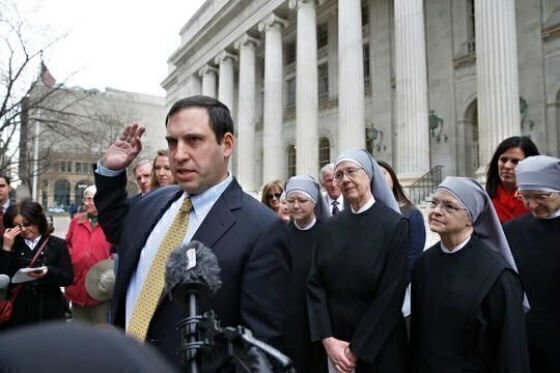
The author will participate in a program on religious liberty at the National Constitution Center on September 21. Learn more and get tickets. Other commentary comes from Robin Fretwell Wilson, Marci Hamilton and Douglas Laycock.
As Pope Francis travels to Cuba, my family’s homeland, I think of my father on his deathbed. Even though dementia made him forget who my mother and I were, he still hissed, “that man,” when he spotted Fidel Castro on TV. “That man” had been the reason we had suffered years of poverty and exile in Puerto Rico. “That man” had wiped out civil society and become both judge and jury. He established a Communist dictatorship and—50 years later—had yet to hold elections. I grew up with “that man.”
“That man” is also the reason I work at The Becket Fund for Religious Liberty. I grew up with a deep understanding that no man should ever have such power. I am eager to defend our Constitution, which explicitly guarantees this. I am proud to stand up at a baseball game, put my hand over my heart and recite the Pledge of Allegiance, one nation under God, as I remind myself and others that our country was founded on the idea that no one man can claim to be the source of our rights, and that the government cannot do so either. Our rights do not come from the state; therefore, the state cannot take them away.
This understanding of our inalienable rights is what makes it possible for us to live in a country where principled people can peacefully disagree with each other and with our government without fearing arrest or detention. This is the principle that explains why our government respects the rights of conscientious objectors, rather than forcing them to go to war.
Recently, this right has been disputed in a case where an order of nuns, the Little Sisters of the Poor, are being threatened by the government with crushing IRS fines because they refuse to act against their conscience.
Opponents argue that the Sisters’ objections to paying for and distributing contraceptives and abortion-causing drugs—or to allowing the government to hijack their own healthcare plan for the same purpose—are downright silly. In condescending terms, the government has characterized the Sisters’ principled stance as fighting “imaginary dragons.” Meanwhile, the government has exempted large corporations—like Pepsi Bottling and Exxon—from the same contraceptive-related regulation, while also pouring millions of tax dollars into programs that distribute these same drugs at no cost to any woman who requests them.
No one can really believe that the government would need Catholic nuns to distribute these drugs and devices, and no American should support the government’s position.
Before my father died, he reminded me many times that what “that man” did was take upon himself a power that was not his. He reminded me that no one had a right to touch my conscience and that no one in this country could tell me what to believe or not to believe. A few days ago, five federal judges in the Tenth Circuit reminded their own colleagues of this same fact: “It is not the job of the judiciary to tell people what their religious beliefs are.”
All the Sisters want to do is to continue to live and serve the elderly poor according to their own conscience. This is a right we must defend, because the fate of the Little Sisters is the fate of every single American who wants to live according to his or her own deeply held religious beliefs without undue government intrusion.
Kristina Arriaga is the Executive Director of the Becket Fund for Religious Liberty. As a Cuban American, she has felt a lifelong passion for issues associated with personal freedom. She is a frequent guest and commentator on religious liberty on shows such as NPR's All Things Considered, MSNBC and Fox. Follow her on Twitter at @ArriagaKristina.







